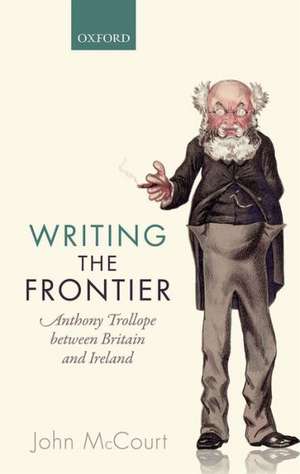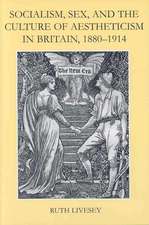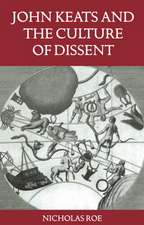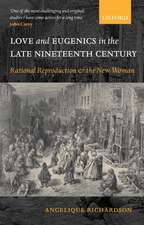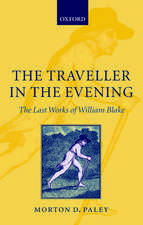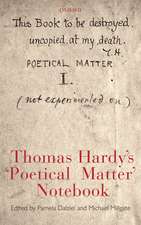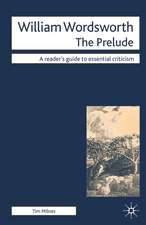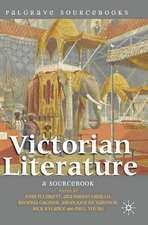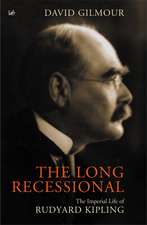Writing the Frontier: Anthony Trollope between Britain and Ireland
Autor John McCourten Limba Engleză Hardback – 19 mar 2015
Preț: 627.76 lei
Preț vechi: 901.03 lei
-30% Nou
Puncte Express: 942
Preț estimativ în valută:
120.12€ • 125.42$ • 99.42£
120.12€ • 125.42$ • 99.42£
Carte tipărită la comandă
Livrare economică 24-31 martie
Preluare comenzi: 021 569.72.76
Specificații
ISBN-13: 9780198729600
ISBN-10: 019872960X
Pagini: 336
Dimensiuni: 147 x 222 x 25 mm
Greutate: 0.53 kg
Editura: OUP OXFORD
Colecția OUP Oxford
Locul publicării:Oxford, United Kingdom
ISBN-10: 019872960X
Pagini: 336
Dimensiuni: 147 x 222 x 25 mm
Greutate: 0.53 kg
Editura: OUP OXFORD
Colecția OUP Oxford
Locul publicării:Oxford, United Kingdom
Recenzii
John McCourt's Writing the Frontier: Anthony Trollope between Britain and Ireland and Mark Ford's Thomas Hardy: Half a Londoner both achieve genuinely far-reaching new perspectives.
In this otherwise illuminating Study, McCourt establishes Trollope's substantial contribution to nineteenth-century Irish fiction, and perceptively explores the ways in which an eminently "English" writer could also be "ambiguously, unstably, and sporadically quasi-Irish". The result is a map of the troubled frontier between Ireland and England in the latter half of the nineteenth-century from the perspective of a novelist who knew both sides better than most.
The admirable work that McCourt has done ... provides an elegant rereading of Trollope as a participant observer whose twenty years of living in Ireland provided him with an experience of Irish culture unequalled by other canonical Victorian writers ... McCourt displays an encyclopedic knowledge of his subject ... a welcome addition to the canon of Trollope criticism: the first and much needed authoritative book-length study of the authors Irish writings.
It is not the least virtue of McCourts impeccably researched book that he manages to avoid the temptation of simply holding an ideological Geiger counter up to the works and declaring them radioactive and hence of no literary value. The literary critic in him sees the banality of such sociological reductionism.
This book is an important contribution to current attempts to theorize and complicate previous dismissals of the nineteenth-century Irish novel. McCourt draws on a range of earlier critical work, sustains a dialogue with all previous critics who have looked at Trollopes Irish fiction, maintains a masterly control over every detail of the Irish fiction, and makes a very strong case that this body of work is a considerable, though flawed, achievement on Trollopes part. On the basis of this very insightful and clear-thinking contribution to both Trollope Studies and Irish Studies, perhaps Trollopes contemporary relevance will be pursued further.
His book continues and, perhaps, crowns a historiographical tradition of writing about Trollope and Ireland, of which Owen Dudley Edwards and R.F. Foster are arguably the most important representatives ... McCourt's significant contribution to Trollope scholarship will thus be a standard in discussions about Trollope and Ireland in the years to come. Perhaps most importantly, it should once and for all force scholars to give Trollope's novels the prominent place in the history of Irish literature that they deserve.
The picture of Trollope that emerges from McCourt's book may seem familiar at first sight, but the level of detail with which it is dealt with serves to upset many cherished beliefs, challenging ingrained prejudices about Trollope's Englishness as well as complicating recent claims about his progressive credentials. McCourt's significant contribution to Trollope scholarship will thus be a standard in discussions about Trollope and Ireland in the years to come. Perhaps most importantly, it should once and for all force scholars to give Trollope's novels the prominent place in the history of Irish literature that they deserve.
McCourt gives us a fascinating re-reading of these scorned early novels ... highly persuasive ... [he] provides a fascinating exploration of a voice neglected in the canon of 19th century Irish writing because Trollope is an outsider. But his early books, especially, are the works of an outsider more familiar with daily life across the island than many of his Irish contemporaries were.
Writing the Frontier examines Irish-related fiction in Trollope's work and in doing so draws extensively on a wealth of research and commentary. His use of other texts is revelatory and highly enjoyable. ... The frontier of John McCourt's impressive book is not the border but the barrier preventing two nations from understanding one another, a frontier which, while he lived in Ireland and for many years afterwards, Trollope tried to penetrate.
The first full-length book to analyse Trollope and Ireland. It will help to complete the re-evaluation of a writer who in his psychological amplitude should be placed with 19th-century masters such as Balzac.
This is an important new study: rich in insight and rigorous in argumentation; it is a clearly written, passionate and persuasive book that makes a familiar figure seem refreshingly strange--and relevant--once again.
McCourt has produced a captivating and valuable tool for the study of a part of Trollopes life and work that has hitherto been overlooked. In addition, he offers a particular and personalized look at Irish-English relations during the Victorian period through the eyes of a writer who lived on both sides of the sea. McCourt nicely balances literary criticism and historical context to present a clear picture of Trollope, Ireland, and the connection between the two.
In this otherwise illuminating Study, McCourt establishes Trollope's substantial contribution to nineteenth-century Irish fiction, and perceptively explores the ways in which an eminently "English" writer could also be "ambiguously, unstably, and sporadically quasi-Irish". The result is a map of the troubled frontier between Ireland and England in the latter half of the nineteenth-century from the perspective of a novelist who knew both sides better than most.
The admirable work that McCourt has done ... provides an elegant rereading of Trollope as a participant observer whose twenty years of living in Ireland provided him with an experience of Irish culture unequalled by other canonical Victorian writers ... McCourt displays an encyclopedic knowledge of his subject ... a welcome addition to the canon of Trollope criticism: the first and much needed authoritative book-length study of the authors Irish writings.
It is not the least virtue of McCourts impeccably researched book that he manages to avoid the temptation of simply holding an ideological Geiger counter up to the works and declaring them radioactive and hence of no literary value. The literary critic in him sees the banality of such sociological reductionism.
This book is an important contribution to current attempts to theorize and complicate previous dismissals of the nineteenth-century Irish novel. McCourt draws on a range of earlier critical work, sustains a dialogue with all previous critics who have looked at Trollopes Irish fiction, maintains a masterly control over every detail of the Irish fiction, and makes a very strong case that this body of work is a considerable, though flawed, achievement on Trollopes part. On the basis of this very insightful and clear-thinking contribution to both Trollope Studies and Irish Studies, perhaps Trollopes contemporary relevance will be pursued further.
His book continues and, perhaps, crowns a historiographical tradition of writing about Trollope and Ireland, of which Owen Dudley Edwards and R.F. Foster are arguably the most important representatives ... McCourt's significant contribution to Trollope scholarship will thus be a standard in discussions about Trollope and Ireland in the years to come. Perhaps most importantly, it should once and for all force scholars to give Trollope's novels the prominent place in the history of Irish literature that they deserve.
The picture of Trollope that emerges from McCourt's book may seem familiar at first sight, but the level of detail with which it is dealt with serves to upset many cherished beliefs, challenging ingrained prejudices about Trollope's Englishness as well as complicating recent claims about his progressive credentials. McCourt's significant contribution to Trollope scholarship will thus be a standard in discussions about Trollope and Ireland in the years to come. Perhaps most importantly, it should once and for all force scholars to give Trollope's novels the prominent place in the history of Irish literature that they deserve.
McCourt gives us a fascinating re-reading of these scorned early novels ... highly persuasive ... [he] provides a fascinating exploration of a voice neglected in the canon of 19th century Irish writing because Trollope is an outsider. But his early books, especially, are the works of an outsider more familiar with daily life across the island than many of his Irish contemporaries were.
Writing the Frontier examines Irish-related fiction in Trollope's work and in doing so draws extensively on a wealth of research and commentary. His use of other texts is revelatory and highly enjoyable. ... The frontier of John McCourt's impressive book is not the border but the barrier preventing two nations from understanding one another, a frontier which, while he lived in Ireland and for many years afterwards, Trollope tried to penetrate.
The first full-length book to analyse Trollope and Ireland. It will help to complete the re-evaluation of a writer who in his psychological amplitude should be placed with 19th-century masters such as Balzac.
This is an important new study: rich in insight and rigorous in argumentation; it is a clearly written, passionate and persuasive book that makes a familiar figure seem refreshingly strange--and relevant--once again.
McCourt has produced a captivating and valuable tool for the study of a part of Trollopes life and work that has hitherto been overlooked. In addition, he offers a particular and personalized look at Irish-English relations during the Victorian period through the eyes of a writer who lived on both sides of the sea. McCourt nicely balances literary criticism and historical context to present a clear picture of Trollope, Ireland, and the connection between the two.
Notă biografică
John McCourt was born and educated in Dublin. He has lived and worked in Italy for over twenty years. He has published widely in the field of Irish Studies, focussing on both nineteenth and twentieth century literature. John is currently an associate Professor of English at Università Roma Tre. He holds a Ph.D. from the National University of Ireland (University College Dublin) and is a specialist in Joyce Studies and in nineteenth and twentieth century Irish literature. The co-founder of the Trieste Joyce School (1997), he is widely published and best known for The Years of Bloom: Joyce in Trieste 1904-1920, (University of Wisconsin Press/Lilliput Press).
